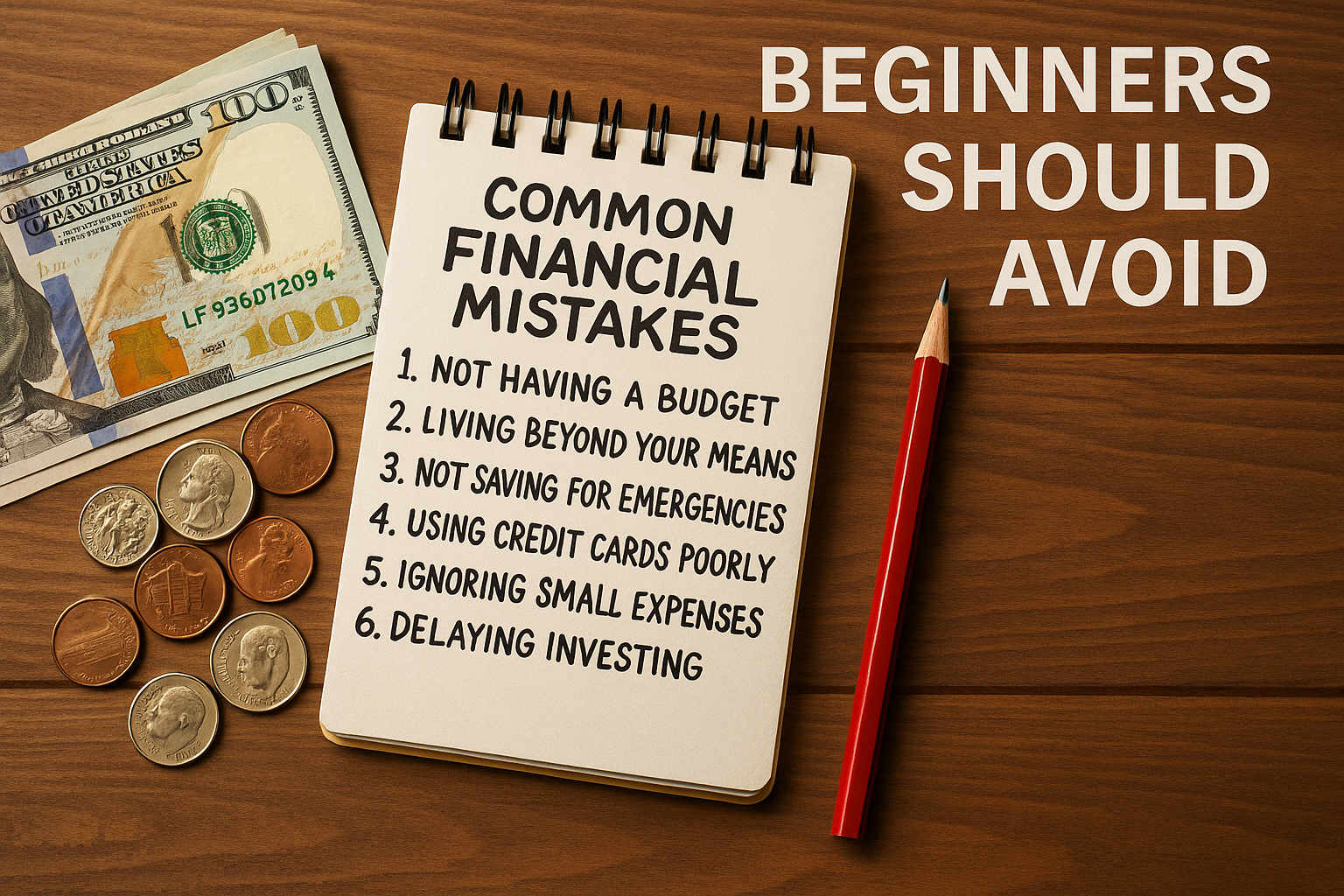Starting your financial journey can be exciting—but also filled with pitfalls. Many beginners make the same mistakes over and over, which can delay progress and create unnecessary stress. The good news? Most of these mistakes are easy to avoid once you know what to look out for.
In this guide, we’ll explore the most common financial mistakes beginners make—and how you can steer clear of them.
1. Not Having a Budget
One of the biggest financial mistakes is not creating a budget. Without a budget, it’s easy to spend more than you earn or forget where your money is going.
A simple monthly budget helps you:
- Track your spending
- Stay within your means
- Save for important goals
- Avoid debt
Start with something simple like the 50/30/20 rule, and build from there.
2. Living Paycheck to Paycheck
Many beginners fall into the cycle of living paycheck to paycheck. Even when their income increases, they still end up broke before the end of the month. This happens when:
- You spend everything you earn
- You don’t prioritize savings
- You rely on credit to cover shortfalls
To break this cycle, you need to spend less than you earn and automate your savings.
3. Not Saving for Emergencies
Life is full of unexpected expenses: car repairs, medical bills, job loss. Without an emergency fund, these situations can lead to debt and financial stress.
Start small with a goal of $500 to $1,000, and aim for 3–6 months of essential expenses over time. Keep the money in a separate savings account.
4. Using Credit Cards Without a Plan
Credit cards are not “free money.” Many beginners use them carelessly and end up in high-interest debt they can’t repay.
To avoid this:
- Only charge what you can pay off in full
- Avoid making only the minimum payment
- Use credit to build your score—not to fund your lifestyle
5. Ignoring Small Expenses
That daily coffee, streaming subscription, or weekend takeout might seem harmless—but small expenses add up quickly. Without tracking, they can destroy your budget.
👉 Tip: Do a “subscription audit” every few months to cancel services you no longer use.
6. Not Setting Financial Goals
When you don’t have clear goals, you’re more likely to waste money or save with no direction. Goals give your money purpose and help you stay motivated.
Start with SMART goals:
- Specific
- Measurable
- Achievable
- Relevant
- Time-bound
Examples:
- Save $1,000 for an emergency fund in 6 months
- Pay off $500 of credit card debt in 3 months
7. Thinking It’s “Too Early” to Invest
Many beginners wait too long to start investing because they think:
- “I don’t have enough money.”
- “I don’t know enough.”
- “It’s too risky.”
But the earlier you start, the more you benefit from compound interest. You can start with small amounts through:
- Robo-advisors
- ETFs
- Retirement accounts (like Roth IRA, 401(k), etc.)
8. Trying to Keep Up with Others
Trying to “keep up” with friends, coworkers, or influencers can wreck your finances. That luxury trip or new gadget may not fit your budget, and comparison can lead to poor spending habits.
Focus on your goals, your income, and your priorities—not someone else’s highlight reel.
9. Not Understanding Interest Rates
Interest can work for you (when you invest) or against you (when you borrow). Beginners often don’t fully understand how:
- High-interest credit card debt compounds fast
- Low-interest savings accounts grow slowly
- Interest affects loan repayments
Always read the fine print on any loan or credit card agreement.
10. Delaying Financial Education
The longer you wait to learn about money, the more you’ll spend unnecessarily or miss opportunities. Financial literacy is a life skill—the sooner you develop it, the more control you have.
Even reading one article, one book, or watching one video per week can make a huge difference.
Final Thoughts: Learn from Mistakes—But Don’t Repeat Them
Everyone makes financial mistakes, especially in the beginning. The key is to learn from them, make adjustments, and move forward with more confidence.
Avoiding these common mistakes will help you build a stronger financial foundation—and save you years of frustration.
